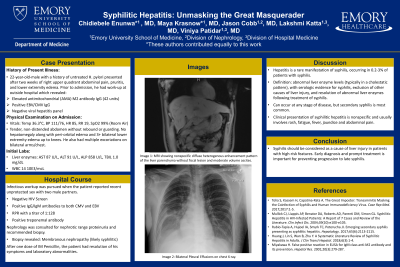Back


Poster Session A - Sunday Afternoon
Category: Liver
A0582 - Syphilitic Hepatitis: Unmasking "The Great Masquerader"
Sunday, October 23, 2022
5:00 PM – 7:00 PM ET
Location: Crown Ballroom

Has Audio

Chidiebele Enunwa, MD
Emory Internal Medicine
Atlanta, GA
Presenting Author(s)
Chidiebele Enunwa, MD1, Maya Krasnow, MD1, Lakshmi Katta, MD1, Viniya Patidar, MD1, Jason Cobb, MD2
1Emory Internal Medicine, Atlanta, GA; 2Emory University School of Medicine, Atlanta, GA
Introduction: Syphilis is a bacterial infection known as ‘The Great Masquerader’ for its ability to mimic other diseases. We present the case of a young man with abdominal pain and abnormal liver enzymes, initially thought to have a primary liver pathology, who was found to have secondary syphilis.
Case Description/Methods: A 22-year-old male with a past medical history of H. pylori presented after two weeks of right upper quadrant abdominal pain, pruritus, and lower extremity edema. Two months prior, he had an EGD with biopsy for nausea, vomiting, and diarrhea that confirmed H. pylori. Treatment was held for elevated LFTs. He was referred to hepatology where workup revealed elevated antimitochondrial (AMA) M2 antibody IgG (42 units), positive EBV/CMV IgG, and a negative viral hepatitis panel.
Physical exam in the ED revealed a tender, non-distended abdomen and lower extremity edema. Labs were significant for AST 87 U/L, ALT 91 U/L, ALP 858 U/L, and TBIL 1.0 mg/dL. MRCP showed nonspecific heterogeneous enhancement of the liver. Infectious workup was pursued when the patient reported recent unprotected sex with male partners, and revealed negative HIV screen, positive IgM/IgG antibodies to both CMV and EBV, positive treponemal antibody, and RPR titer of 1:128. After one dose of Penicillin, the patient had resolution of his symptoms and lab abnormalities.
Discussion: Hepatitis is a rare manifestation of syphilis, occurring in 0.2%-3% of patients with syphilis.1 It is defined as abnormal liver enzyme levels with serological evidence of syphilis, exclusion of other causes of liver injury, and resolution of abnormal liver enzymes after treatment of syphilis.2
Although liver involvement in syphilis can be observed at any stage of the disease, secondary syphilis is most common.3 The clinical presentation of syphilitic hepatitis is nonspecific and usually involves rash and fatigue. Other symptoms are jaundice, fever, and abdominal pain. Lab tests usually show a marked elevation of serum ALP.4
AMA antibodies, typically highly specific for PBC, can be positive due to molecular mimicry.5 A diagnosis of syphilitic hepatitis is supported here by rapid resolution in symptoms and lab abnormalities after treatment with penicillin.
Syphilis should be considered a cause of liver injury in patients with high-risk features, including unprotected sex with multiple partners. Early diagnosis and prompt treatment are important for preventing progression to late syphilis.
Disclosures:
Chidiebele Enunwa, MD1, Maya Krasnow, MD1, Lakshmi Katta, MD1, Viniya Patidar, MD1, Jason Cobb, MD2. A0582 - Syphilitic Hepatitis: Unmasking "The Great Masquerader", ACG 2022 Annual Scientific Meeting Abstracts. Charlotte, NC: American College of Gastroenterology.
1Emory Internal Medicine, Atlanta, GA; 2Emory University School of Medicine, Atlanta, GA
Introduction: Syphilis is a bacterial infection known as ‘The Great Masquerader’ for its ability to mimic other diseases. We present the case of a young man with abdominal pain and abnormal liver enzymes, initially thought to have a primary liver pathology, who was found to have secondary syphilis.
Case Description/Methods: A 22-year-old male with a past medical history of H. pylori presented after two weeks of right upper quadrant abdominal pain, pruritus, and lower extremity edema. Two months prior, he had an EGD with biopsy for nausea, vomiting, and diarrhea that confirmed H. pylori. Treatment was held for elevated LFTs. He was referred to hepatology where workup revealed elevated antimitochondrial (AMA) M2 antibody IgG (42 units), positive EBV/CMV IgG, and a negative viral hepatitis panel.
Physical exam in the ED revealed a tender, non-distended abdomen and lower extremity edema. Labs were significant for AST 87 U/L, ALT 91 U/L, ALP 858 U/L, and TBIL 1.0 mg/dL. MRCP showed nonspecific heterogeneous enhancement of the liver. Infectious workup was pursued when the patient reported recent unprotected sex with male partners, and revealed negative HIV screen, positive IgM/IgG antibodies to both CMV and EBV, positive treponemal antibody, and RPR titer of 1:128. After one dose of Penicillin, the patient had resolution of his symptoms and lab abnormalities.
Discussion: Hepatitis is a rare manifestation of syphilis, occurring in 0.2%-3% of patients with syphilis.1 It is defined as abnormal liver enzyme levels with serological evidence of syphilis, exclusion of other causes of liver injury, and resolution of abnormal liver enzymes after treatment of syphilis.2
Although liver involvement in syphilis can be observed at any stage of the disease, secondary syphilis is most common.3 The clinical presentation of syphilitic hepatitis is nonspecific and usually involves rash and fatigue. Other symptoms are jaundice, fever, and abdominal pain. Lab tests usually show a marked elevation of serum ALP.4
AMA antibodies, typically highly specific for PBC, can be positive due to molecular mimicry.5 A diagnosis of syphilitic hepatitis is supported here by rapid resolution in symptoms and lab abnormalities after treatment with penicillin.
Syphilis should be considered a cause of liver injury in patients with high-risk features, including unprotected sex with multiple partners. Early diagnosis and prompt treatment are important for preventing progression to late syphilis.
Disclosures:
Chidiebele Enunwa indicated no relevant financial relationships.
Maya Krasnow indicated no relevant financial relationships.
Lakshmi Katta indicated no relevant financial relationships.
Viniya Patidar indicated no relevant financial relationships.
Jason Cobb indicated no relevant financial relationships.
Chidiebele Enunwa, MD1, Maya Krasnow, MD1, Lakshmi Katta, MD1, Viniya Patidar, MD1, Jason Cobb, MD2. A0582 - Syphilitic Hepatitis: Unmasking "The Great Masquerader", ACG 2022 Annual Scientific Meeting Abstracts. Charlotte, NC: American College of Gastroenterology.
